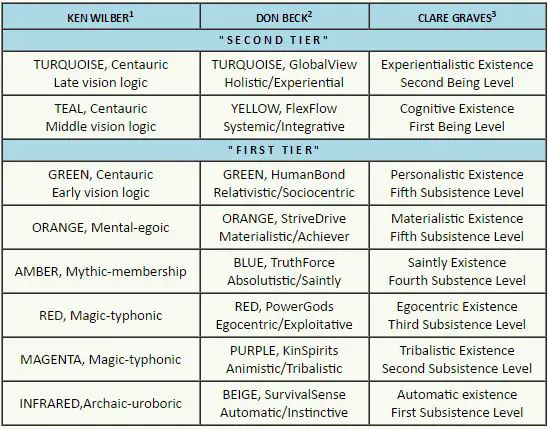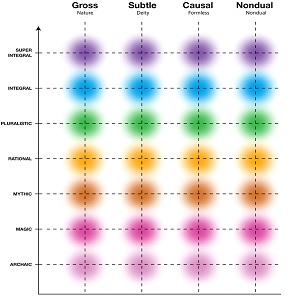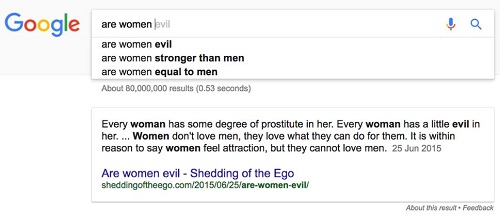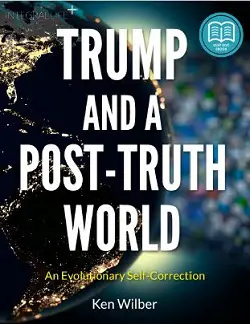|
TRANSLATE THIS ARTICLE
Integral World: Exploring Theories of Everything
An independent forum for a critical discussion of the integral philosophy of Ken Wilber
 David Christopher Lane, Ph.D.
Professor of Philosophy, Mt. San Antonio College Lecturer in Religious Studies, California State University, Long Beach Author of Exposing Cults: When the Skeptical Mind Confronts the Mystical (New York and London: Garland Publishers, 1994) and The Radhasoami Tradition: A Critical History of Guru Succession (New York and London: Garland Publishers, 1992). David Christopher Lane, Ph.D.
Professor of Philosophy, Mt. San Antonio College Lecturer in Religious Studies, California State University, Long Beach Author of Exposing Cults: When the Skeptical Mind Confronts the Mystical (New York and London: Garland Publishers, 1994) and The Radhasoami Tradition: A Critical History of Guru Succession (New York and London: Garland Publishers, 1992).SEE MORE ESSAYS WRITTEN BY DAVID LANE The Missing NuanceKen Wilber, Chroma Casting, and Google SearchesA Four-Part Critique, Part ThreeDavid Lane
No, academia is not the Frankenstein-like parent of all the “green madness” we see in the world and the Internet.
I have criticized Ken Wilber's color coding before in an article entitled “Integral Apartheid” because such monochromatic labeling is what Daniel Dennett rightly refers to as “cheap reductionism” since it overly simplifies human behavior and attitudes. Besides being intellectually lazy as a shorthand form of psychological stereotyping, Wilber's overuse of it, as we will see in his e-book on Trump, lulls the reader into inappropriately reifying (“making a thingy out of an abstraction”) colors as objective features. This has the unwanted effect of creating the illusion that such chroma-casting is how different perspectives operate in a real world. Ken Wilber's color-coding [see below table for an explanation] is reductionism at its most absurd. For instance, why use such a lettered schema when numbers would do as well? It would be just as easy to say the following: Green is 6, Red is 3, Amber is 4, Turquoise is 8, orange is 5, and then instead of wasting time and space (since Wilber tends to claim that he doesn't have “times to address . . . these issues adequately”), we can simply have a number discussion and/or debate. 
A comparison of Ken Wilber, Don Beck and Clare Graves
(www.integralworld.net/wilber_sd.html) To illustrate how truly ridiculous and misleading Wilber's chroma casting can be, read the following excerpt from his recent e-book and then read it with just numbers:
“Trump's anti-green impulse runs serious, far, and vast (though he consciously is aware of none of this). Whether his proposals are red or amber or orange, they are always also anti-green. And that is the one thing they all have in common, whether they are red, amber, or orange—they are all energized in part by this anti-green self-correcting drive of evolution in search of a functional and self-organizing way forward . . .” (p. 33)
“Trumps's anti-6 impulse runs serious, far, and vast (though he consciously is aware of none of this). Whether his proposals are 3 or 4 or 5, they area always anti-6. And that is the one thing they all have in common, whether they are 3, 4, or 5—they are all energized in part by this anti-6 self correcting drive of evolution in search of a functional and self-organizing way forward. . . .” Reducing human intentions, ideas, and behaviors to colors is no different than reducing them to numbers, since both are merely indolent truncations that avoid a deeper and qualifying analysis. There is no need to rush our intellectual appraisements. Given Wilber's modus operandi, we might as well use emojis when discoursing on politics. Instead of green (or 6), we could use a happy face such as this : ) and instead of red being a 3, it could be this : ( 
Wilber's color coding is ripe for parody and so it should be since Wilber's consistent lack of nuance, misuse of statistics, and indulgent hyperboles detracts from some of the larger points he is attempting to make. It also tends to get lost in a sea of generalizations, where specificity is warranted. In going over his e-book, I thought it might be amusing to see how many times he uses the word “green”, keeping in mind that its repeated usage is his way to short circuit a deeper and more nuanced argument. After counting over 100 times that he used the word “green” I gave up even though I knew there were more to be had. [it is 254] I found his discussion on aperpectivalism intriguing, even if again too exaggerated and simplistic to be compelling. For instance, Wilber seems surprised to note that Google's search engine isn't designed to discover truth when as he argues
“There is nothing that checks whether any of the recommendations are actually true or good or beautiful or unifying or integrating or any other value, and express only the aperspectival madness of 'no truth to be favored.'” (p. 21)
Well, this should come as no surprise to anyone conversant to how Google emerged as the most successful search engine in Internet history. In the early days of the web, as developed by Tim Berners-Lee, finding good websites was usually done almost randomly until Yahoo's Jerry Yang and David Filo at Stanford University in early 1994 created a hierarchically arranged subject data base—but even then there were humans searching out sites worthy of a second look. When Google was founded in the late 1990s by Sergey Brin and Larry Page (both from Stanford University as well), they developed an algorithm where “link popularity” could be a suggestive and useful indicator of a particular web page's worthiness. This almost immediately garnered better results (in terms of relevance for the user) than other search engines at the time, including Alta Vista which was for many academicians the most inclusive and powerful tool for finding information on the web. What made Google so effective was precisely because it focused on popularity and not on assessing the intrinsic value (the true, the good, and the beautiful) of the site in question. That was left up to human beings in their quest for knowledge to determine. While I can readily understand that we have a growing apprehension of how powerful and influential certain computational and Internet companies have become (Apple, Amazon, Google, Microsoft, and Facebook, to name the leading five), we must ground our future fears in the history of what came before. Google has liberated knowledge and our access to it in ways unimaginable just thirty years ago, even if we should be cautious about how we employ it. But Wilber will have us believe that Google is imprisoning us with its “aperspectival madness” since he argues:
“Google is most definitely not 'organizing the world's information and making it universally accessible and useful.' It is disorganizing the world's information in an atmosphere of aperspectival madness, taking 'diversity' to such an extreme that all views have an egalitarian and perfectly equal claim to validity. It is a leading-edge that is deeply discombobulated.” (p. 22)
Here, as is typical of Wilber, he grossly exaggerates to underline his criticism of aperspectivalism, neglecting to remember that it is up to human beings to make the final judgments and appraisements on what they find on the Internet—not Google, not Bing, not Firefox, not Safari, or any other search engine. Yes, it can indeed be dangerous to over rely on Google, just as it is dangerous to over rely on the Encyclopedia Britannica or be caught in the delusion that the Great Books of the Western World (which were the mainstay of libraries throughout North America in the mid to late 20th century) are rightful and true repositories of all that should be known. Lest we forget, most editions of that widely owned but seldom read collection didn't have one female author or one of color. It is not so much that Google is entrapped in some evil “aperspectival” lunacy, as Wilber wrong infers, but that its powerful utility is precisely because it is inclusive and looks for the most popular returns from those who use its search engine. Anyone who is somewhat conversant with the Internet and its long history should be aware that it is a tool and as such should be used with caution and care, including whatever new apps pop up from time to time to mine its riches. But instead of a judicious and more accurate historical lesson about how the Internet and its most significant application, the World Wide Web, blossomed, Wilber goes onto a rant where he blames academia for almost everything that has gone bad in the world and how University liberalism (and the notion of “no objective truth”) has spoiled all that it touches. As Wilber harangues,
And it's going 'terribly wrong' because today's leading-edge has virtually no idea of what “genuinely right” could possibly mean. The Guardian highlights the overall piece by pointing out that it doesn't just demonstrate this with Google, but also Facebook and, indeed, the general Internet culture itself: 'The Internet echo chamber satiates our appetite for pleasant lies and reassuring falsehoods and has become the defining challenge of the 21st century.'
How could an item become the 'defining issue' of our century without virtually every university in the world spewing out postmodern poststructuralist nostrums centering on the idea that 'truth' itself is the single greatest oppressive force in the history of humankind? (Seriously.) Originated by the green leading-edge in academia, this aperspectival madness of “no truth” leapt out of the universities, and morphed into an enormous variety of different forms—from direct “no-truth” claims, to rabid egalitarianism, to excessive censoring of free speech and unhampered knowledge acquisition, to extreme political correctness (that forced the best comedians to refuse to perform at colleges any more, since the audiences 'lacked all sense of humor': you're allowed to laugh at nothing in a 'no value is better' world—even though that value itself is held to be better), to far-left political agendas that in effect 'equalized poverty,' to egalitarian “no judgment” attitudes that refused to see any 'higher' or 'better' views at all (even though its own view was judged 'higher' and 'better' than any other), to modes of entertainment that everywhere eulogized egalitarian flatland, to a denial of all growth hierarchies by confusing them with dominator hierarchies (which effectively crushed all routes to actual growth in any systems anywhere), to the media's sense of egalitarian 'fairness' that ended up trying to give equal time to every possible, no matter how factually idiotic, alternative viewpoint (such as Holocaust deniers), to echo chambered social media where “pleasant lies” and “reassuring falsehoods” were the standard currency. It saturated the leading-edge of evolution itself, throwing it into a performative contradiction and a widespread, explicit or implicit, aperspectival madness which was soon driven by nihilism and narcissism and a whole post-truth culture, which even invaded the Internet and bent it profoundly, and that brokenness perfused the entire information grid of the overall culture itself —exactly the type of profound and extensive impact you expect a leading edge (healthy or unhealthy) to have. It has indeed become the defining issue of our century, because not a single other issue can be directly and effectively addressed if there is no compass point of accessible truth to guide action in the first place.” (p. 22-24) There is much to unpack here, but let's right to the jugular and point out where Wilber grossly overstates his case and who and what is at fault. Wilber believes that universities worldwide are to blame for
“spewing out postmodern poststructuralist nostrums centering on the idea that 'truth' itself is the single greatest oppressive force in the history of humankind.” (p. 23)
First, no one university is exactly the same as another and each of them have a large number of divisions—ranging from the sciences to the humanities—with their own departments. So to be clear, do the engineering departments claim “truth itself is the single greatest oppressive force in the history of humankind.” Do business departments? Do physics or chemistry departments? Do agricultural departments? Do biology departments? Do mathematics departments? Of course not. So who really is the boogieman in the University that is wreaking such havoc on the world? Philosophy departments? English departments? Sociology departments? Well, even here, as any student or professor knows there are wide variances of ideas and opinions. There is nothing uniform in any of these departments; much less some universal acclamation that proclaims to all and sundry, “no truth” exists! Why does Wilber sink to such categorical nonsense? From 1984 to 1990, I taught in the Warren College Writing Program at the University of California, San Diego, and was once a mentor (on how to engage students) to the chairperson of the English department at UCSD. This was when Derrida, Foucault, and other deconstructionist thinkers were something of a rage among a few (certainly not the majority) professors in the humanities. But even when this “postmodern” movement was peaking, there were vigorous debates within and outside the academy about how to interpret key texts and what they ultimately portended. But at no time (and this is the point I wish to emphasize) was there a widespread consensus about what Wilber alleges is rampant, that is, “your truth is yours and mine is mine and the twain shall never meet.” If anything, the one consistent theme in every academic department I have had the privilege to serve in (from English to Philosophy to Sociology to Psychology) is that objective standards matter and should be taught to each and every student—freshmen or graduate. The notion that “no truth” exists is a fiction that Wilber is perpetuating in order to flog an academic straw man of his own making. No, academia is not the Frankenstein-like parent of all the “green madness” we see in the world and the Internet. What happened is a bit simpler and more complex than what Wilber proclaims. First, the Internet was the brainchild not of “your truth, my truth” acolytes but of those in the military and at universities wanting to open up a computational pipeline of communication. Furthermore, Tim Berners-Lee, operating out of CERN working on his Steve Jobs inspired NeXT computer didn't develop hypertext mark up language (HTML) because he was inspired by a Derrida influenced epiphany that “all is relative.” No, the Internet and the World Wide Web were created to solve communicative impasses and develop new tools for transmitting both trivial and important messages. What this did is democratize (not demonize) information, allowing the masses hitherto access to data and the ability to farm such for their own purposes—sometimes positively and sometimes nefariously. Ironically, the real culprit for what many find disturbing about the Internet isn't due to universities or its post-structuralist professors, but to businesses and entrepreneurs (again, some progressive and some shady) wanting to piggy back on the ever-widening Information Highway and make money. I am quite aware of this because I have been on the Internet since 1984 and distinctly remember when the World Wide Web first went public. In those days, there was essentially no advertising and very little spam. That all changed, of course, when A.O.L. and other service providers came online and businesses started to realize that fortunes could be made (and lost) by going online. In the 1980s the Internet was more or less commercial free. After 1994, however, it was flooded with all sorts of items for sale and exchange. Because the communicative platform of the Net is flat, it allowed almost anyone to have a voice and this opened up a floodgate of possibilities. Digital capital boomed and with it millions of voices that had never been heard of before. What this unleashed was the ability of erstwhile-unknown individuals (who couldn't afford to share their ideas, their pictures, their movies, their opinions, their items, their whatevers) to express themselves in multiple ways. These were not people inspired (consciously or otherwise) by radical university professors baptized in all things desconstructive, but rather inspired by new possibilities and new openings for asservations. Thus the real reason why there is such a wide variance of facts and information on the Net isn't because of some sinister leftist ideology, but rather because for the first time in human history we are hearing voices from almost all quarters, which includes those who would lie and deceive to make a fast buck (“you mean to tell me that I have a long lost uncle from Nigeria who wants to deposit a million dollars in my bank account? Who knew!”). And, contrary to a solipsistic free for all, a large number of Internet participants want elevated standards and have implemented procedures to distinguish fake news from real news. This includes websites such as snopes.com, factcheck.org, and even Google Scholar which provides access to refereed journal articles. Therefore, it is wholly misleading for Wilber to put so much blame on green-eyed humanities professors peddling their “no objective truth” mantras to the unsuspecting public at large. Even the mostly democratic Wikipedia has established guidelines to avoid spurious entries, so much so in fact that the prestigious scientific journal Nature published a remarkable study in 2005[3] showing the then up and coming web based encyclopedia to be favorably compared with Encyclopedia Britannica when it came to certain entries. In the past twelve years Wikipedia has become even more reliable with stricter guidelines and has become widely used, particularly amongst scientists. But even here, the smart researcher knows that Wikipedia is a great place to start but a bad place to end. So it is the same with any knowledge base and this has been the case since time immemorial. Wilber seems shocked that a Google search can elicit responses that are not wholly truthful as if the search engine should have nobler intentions in its page rank than merely what is most linked or popular. While this is understandable (and explains why Tim Berners-Lee and others want to develop a more semantically based hypertext where what one wants and means correlate seamlessly), it is extraordinarily naïve to be unaware of the present day limits of search. The same holds true for any book that we read or any newspaper article we digest. The reader must be a critical thinker/reader and this applies to every aspect of life, not just the Internet. Wilber quotes Carole Cadwalladr (writing for the Guardian)[3] as being particularly alarmed when she typed in 'Are Jews…' and before she could finish, Google's search engines had provided the most likely responses, one of which was 'Are Jews evil?' Curious, she hit that entry, and was taken to the authoritative Google page of the 10 most common and popular answers, 9 of 10 of which said, in effect, 'Yes, definitely, Jews are evil.' Genuinely surprised—and alarmed—she states, 'Google is knowledge. It's where you go to find things out. And evil Jews are just the start of it. There are also evil women. This is what I type: 'a-r-e w-o-m-e-'. And Google offers me just two choices, the first of which is 'Are women evil?' I press return. Yes, they are. Every one of the 10 results 'confirms' that they are, including the top one, from a site which is boxed out and highlighted: 'Every woman has some degree of prostitute in her. Every woman has a little evil in her…. Women don't love men, they love what they can do for them.' With her disbelief—and alarm—growing, she continues, “Next I type: 'are m-u-s-l-i-m-s'. And Google suggests I should ask: 'Are Muslims bad?' And here's what I find out: yes, they are. That's what the top result says and six of the others. Google offers me two new searches and I go for the first, 'Islam is bad for society.' In the next list of suggestions, I'm offered: 'Islam must be destroyed.'”  Yet, here Wilber is also being disingenuous and betraying the very “integral” approach he so stridently argues for because 24 hours after Cadwalladr's article appeared in the Guardian, Google took action and actually remedied part of the problem and even came out with a detailed public statement explaining why such distasteful results can occur:[4] “Our search results are a reflection of the content across the web. This means that sometimes unpleasant portrayals of sensitive subject matter online can affect what search results appear for a given query. These results don't reflect Google's own opinions or beliefs—as a company, we strongly value a diversity of perspectives, ideas and cultures. But does Wilber quote Google's explanation even though it too appeared in the Guardian the next day? No. Why not? Is it because it demonstrates prima facie the vacuity of Wilber's entire thesis? It is duplicitous of Wilber not to cite the Guardian article explaining how quickly Google addressed the issue and how keenly aware they are about the limits of search. More precisely, how trustworthy is Wilber if he only provides us with one side of an issue? I find it truly ironic that in his e-book Wilber doesn't include detailed notes, claiming somewhat lamely that
“I have intentionally not included scholarly bibliographic references; if interested, they can always be Googled—and if you do so, keep in mind what is actually involved with that search process—which is something that will become clear as you read this.” (p. 3)
If Google can mess up so badly, why not go the extra yard and supply references so that the “no truth” infected search engine won't lead us into more digital madness? I jest, of course, since it is obvious that Wilber is writing with a forked tongue. Yes, we are awash with an ocean of information, and yes we should be doubly cautious about what we find when surfing the Net. However, it doesn't then follow that the mean green meme preached by unnamed humanities professors are wreaking havoc throughout cyber land. I would suggest, rather, that the real culprit on the Internet is that too many individuals are allowed to post anonymously without facing consequences for their words or actions and this has allowed far too much acrimony and incivility. It is not that vast swaths of humanoids don't believe in objective or higher truths, but that when given an opportunity to say whatever to whomever whenever some choose to act out on their baser emotions. Some just want to vent anonymously without having to take personal responsibility for the blowback. “Green” extreme has little to do with it. Notes[1] Luciano Floridi, "Fake news and a 400-year-old problem: we need to resolve the “post-truth’ crisis", The Guardian, 29 November 2016. [2] Jim Giles, "Special Report Internet encyclopaedias go head to head", Nature, A response from the Encyclopedia Brittanica. A point-by-point-rebuttal from Nature, 15 December 2005. [3] Carole Cadwalladr, "Google, democracy and the truth about internet search", The Guardian, 4 December 2016. [4] Samuel Gibbs, "Google alters search autocomplete to remove 'are Jews evil' suggestion", The Guardian, 5 December 2016. Popular questions people are asking on Google about Ken Wilber (FV):    |
